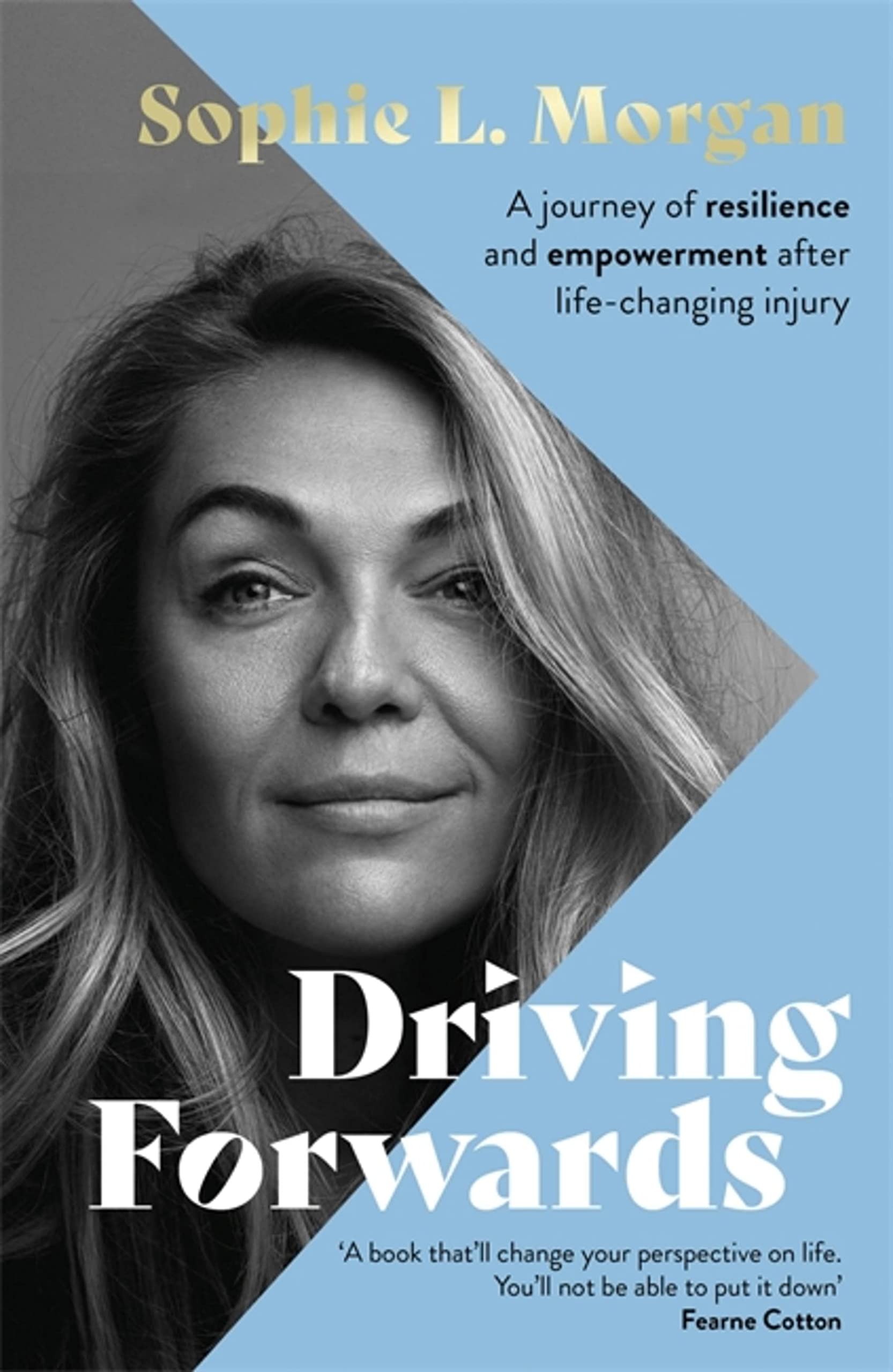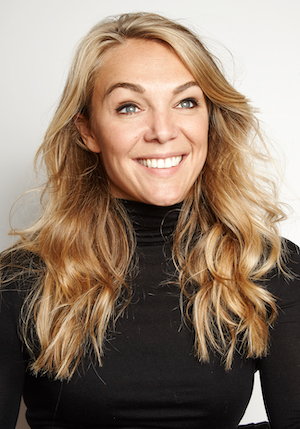
Driving Forwards: a memoir and reflection of life by TV presenter and disability advocate Sophie Morgan
Sophie Morgan is a British journalist, TV presenter, artist and disability activist. Back in March 2022, she released her autobiography – Driving Forwards – in which she shares her journey of resilience and empowerment after a life-changing injury.
Our writer, Raya Al-Jadir, gives a review of Sophie Morgan’s book and highlights the honesty told and the artistic narrative that comes with it.
Who is Sophie Morgan?
Sophie is an award-winning disability advocate, inclusion consultant and one of the first female disabled television hosts in the world.
She is best known for her role as one of the lead presenters of the Paralympic Games (Channel 4) for nearly a decade.
In addition to sports broadcasting, she fronts her own travel series Living Wild, consumer and current affairs documentaries including on Dispatches and Unreported World and is a well-known television personality on shows like ITV’s Loose Women.
Podcast interview with Sophie Morgan
After reading the book, I got the opportunity to talk to Sophie about her experience of writing it and about the life she has so openly shared in it.
Raya’s book review of Driving Forwards
After 18 years of living as a disabled woman, having spent the previous 18 years as a non-disabled person, Sophie decided to put the two halves of her life into a book entitled Driving Forwards.
The blurb of the book description reads: “On the precipice of starting her adult life, aged 18, Sophie, a rebellious and incorrigible wild child, crashed her car and was instantly paralysed from the chest down.
Rushed to hospital, everything she had dreamed for her life was instantly forgotten and her journey to rediscover herself and build a different life began. But being told she would never walk again would come to be the least of her concerns.”
Over the next 18 years, as she strived to come to terms with the change in her body, her relationships were put to the test. She has had to learn to cope with the many unexpected and unpredictable setbacks of living with paralysis.
She has had to overcome her own and other people’s perceptions of disability and explore the limits of her abilities, all whilst searching for love, acceptance, meaning, identity and purpose.
The book is essentially a mixture of a memoir and reflection of the past and the present, Sophie takes the reader through her life journey as we share her ups and downs, positive and negative experiences, but most importantly, we ‘live’ her self-discovery path and this is certainly reflected in the flow and rhythm of the book.
Driving Forwards details Sophie’s life-changing injury, her recovery and her life since.

Sophie Morgan’s setbacks that cause fear and isolation
Strikingly honest, Sophie’s story is unusual and yet relatable. But this memoir is very far from the ‘triumph over tragedy’ tale you might expect – and a lot better for that. Sophie’s wrenchingly honest narrative is full of (literally) agonising setbacks.
An abscess from an allergic reaction to a plaster means that to this day, she must lie – sometimes for months – on her front to prevent it from worsening.
Whether you are disabled or not and regardless of the nature of your disability, you will feel ‘connected’ to Sophie.
For some people, it will be the transition from a non-disabled young woman to a disabled one.
For others, it’s the isolation and loneliness that could only be felt by someone living the experience, or it could be the thoughts of Sophie that many shares but are too afraid to voice them.
Writing in her book, Sophie said: “Up until that point I had believed that all I needed was a positive attitude and to find a way to override my fears, and then, almost anything would be achievable. ‘The only disability in life’ I’d written in my diary less than a month earlier, ‘is a bad attitude.’
But while a person’s attitude, fears, or even their Impairments muggy get in the way, when faced with one of the most inaccessible environments on the planet, I learnt the hard way that ultimately it is the world around us that truly disables us.
But how much was I carrying from my former life that was influencing what goals I was setting in this life? And whose expectations was I trying to challenge?“
She realises that despite her bloody-mindedness, some barriers are simply “too high… to overcome”.
Every disabled person or anyone that has lived with a chronic condition will relate to Sophie’s despondency as she endures isolation with every health setback that results in her having to rest for months in bed.
She described this feeling so adequately: “I lost track of time. The days themselves were scrubbed clean, nameless and blank for me to fill. But what do you do with an empty day when you can’t move? The world continued without me.”
It is that fear of being left behind, of the world moving and you being stuck in a situation that is beyond your control, that almost everyone can relate with, which makes Sophie a ‘human’ that we can all feel that we know without ever meeting her.
They say honesty reaches the heart and Driving Forwards will undoubtedly touch the heart of anyone that reads it.
Sophie Morgan artistically reflects life in the slow lane and fighting battles

One criticism that the book received – during the Disability Horizons book club discussion – was the pace of the book. For the first few chapters, the book feels incredibly slow then towards the end it finishes abruptly as though it was rushed.
Though if we look at it from an analytical perspective then we would realise the book is the life journey of an individual.
Anyone who has experienced hospital stays or bed confinement will know that days are slow and they drag endlessly, hence this had to be reflected artistically in the book.
As we divulge further into Sophie’s life journey, we see her desperation to fit in. She settles in relationships – unable to get beyond the notion that she should be grateful to any man who pays her attention.
She silently endures discomfort and inadequate disabled facilities in case she loses friends or work.
Again, this fear that Sophie discusses and explores through processing her experience is something that many of the readers would be familiar with.
That feeling of knowing that you don’t have a choice over your own life but you do have the choice of how you react and deal with it.
“Because no matter how strong we may believe ourselves to be, no matter how resilient and determined we are, some situations, we have no choice but to surrender that fight, to do our best to let go.
No matter how much you might want to, you can’t overcome your disability like you can override your fear. Just like sometimes you can’t win the battle with cancer or keep fighting with chronic fatigue.
These nonsensical ideals put the responsibility on the person and ignore the fact that no matter how driven you are to survive, sometimes it will not be enough.
Sometimes you are the victim of your circumstances and the only choice you are left with is how you react to them. That is all you can do. You have no other choice.”
Learning to live well with a disability
Sophie’s book is decidedly not a medical-recovery memoir – the familiar story of ‘getting better after an accident’ that so often becomes ‘how I overcame disability’.
Instead, it is a story of learning to live – and live well – with disability. While
Sophie of course has to adapt to her new body and doesn’t shy away from detailing the difficulty of doing so, the book is really a story of finding an identity, a drive and a purpose in making society more inclusive.
There is such power in someone like Sophie, not because of how she adapted to her new life but the power lies in her raw honesty, in discussing every aspect of her life and her emotional and mental state.
She doesn’t shy away from exploring what sexual encounters are like after her accident – an important subject that no one talks about openly.
She is also not ashamed to address the abusive relationship she was involved in.
Most importantly, her ability to address her low points and acknowledge them makes her a powerful figure.
The book ends abruptly, but it feels like there is a sequel towards the end as there are things that Sophie didn’t go into at length like her partners and friends.
Although we do feel that Sophie has finally come to love her disabled body and is somewhat at peace with her former self, one of the most intriguing aspects of the book is tracing the relationship between the young Sophie and the adult Sophie and how it starts as resentment and blame but reaches a happy and somewhat peaceful end.
Yet there is a need to see what life is like beyond the self-acceptance and love that Sophie has found.
I have given the book Driving Forwards a rating of 8/10.
You can buy Driving Forwards on Amazon.
Disability Horizons Book Club

If you love reading books and looking for a friendly community to discuss and review a collection of titles from disabled and non-disabled authors, then come join our virtual book club.
If you would like to join, please email Raya at raya@disabilityhorizons.com and she will send you the Zoom link.
By Raya Al-Jadir
More on Disability Horizons…